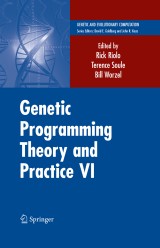Details

Genetic Programming Theory and Practice VI
Genetic and Evolutionary Computation
|
96,29 € |
|
| Verlag: | Springer |
| Format: | |
| Veröffentl.: | 01.11.2008 |
| ISBN/EAN: | 9780387876238 |
| Sprache: | englisch |
| Anzahl Seiten: | 274 |
Dieses eBook enthält ein Wasserzeichen.
Beschreibungen
<P><STRONG>Genetic Programming Theory and Practice VI</STRONG> was developed from the sixth workshop at the University of Michigan’s Center for the Study of Complex Systems to facilitate the exchange of ideas and information related to the rapidly advancing field of Genetic Programming (GP). Contributions from the foremost international researchers and practitioners in the GP arena examine the similarities and differences between theoretical and empirical results on real-world problems. The text explores the synergy between theory and practice, producing a comprehensive view of the state of the art in GP application.</P>
<P>These contributions address several significant interdependent themes which emerged from this year’s workshop, including: (1) Making efficient and effective use of test data. (2) Sustaining the long-term evolvability of our GP systems. (3) Exploiting discovered subsolutions for reuse. (4) Increasing the role of a Domain Expert.</P>
<P>These contributions address several significant interdependent themes which emerged from this year’s workshop, including: (1) Making efficient and effective use of test data. (2) Sustaining the long-term evolvability of our GP systems. (3) Exploiting discovered subsolutions for reuse. (4) Increasing the role of a Domain Expert.</P>
Genetic Programming: Theory and Practice.- APopulationBased Study ofEvolutionaryDynamics inGeneticProgramming.- An Application of Information Theoretic Selection to Evolution of Models with Continuous-valued Inputs.- Pareto Cooperative-Competitive Genetic Programming: A Classification Benchmarking Study.- Genetic Programming with Historically Assessed Hardness.- Crossover and Sampling Biases on Nearly Uniform Landscapes.- Analysis of theEffects ofElitismonBloat inLinear and Tree-basedGenetic Programming.- Automated Extraction of Expert Domain Knowledge from Genetic Programming Synthesis Results.- Does Complexity Matter? Artificial Evolution, Computational Evolution and the Genetic Analysis of Epistasis in Common Human Diseases..- Exploiting Trustable Models via Pareto GP for Targeted Data Collection.- Evolving Effective Incremental Solvers for SAT with a Hyper-Heuristic Framework Based on Genetic Programming.- ConstrainedGenetic Programming toMinimizeOverfitting in StockSelection.- Co-Evolving Trading Strategies toAnalyzeBoundedRationality inDouble Auction Markets..- Profiling Symbolic Regression-Classification.- Accelerating Genetic Programming through Graphics Processing Units..- Genetic Programming for Incentive-Based Design within a Cultural Algorithms Framework..
<P><STRONG>Genetic Programming Theory and Practice VI</STRONG> was developed from the sixth workshop at the University of Michigan's Center for the Study of Complex Systems to facilitate the exchange of ideas and information related to the rapidly advancing field of Genetic Programming (GP).</P>
<P>Contributions from the foremost international researchers and practitioners in the GP arena examine the similarities and differences between theoretical and empirical results on real-world problems. The text explores the synergy between theory and practice, producing a comprehensive view of the state of the art in GP application.</P>
<P></P>
<P>These contributions address several significant inter-dependent themes which emerged from this year's workshop, including:</P>
<P></P>
<UL>
<P>
<LI>Making efficient and effective use of test data</LI>
<P></P>
<P>
<LI>Sustaining the long term evolvability of our GP systems</LI>
<P></P>
<P>
<LI>Exploiting discovered subsolutions for reuse</LI>
<P></P>
<P>
<LI>Increasing the role of a Domain Expert</LI>
<P></P></UL>
<P></P>
<P>In the course of investigating these themes, the chapters describe a variety of techniques in widespread use among practitioners who deal with industrial-scale, real-world problems, such as: <BR></P>
<UL>
<P>
<LI>Pareto optimization, particularly as a means to limit solution complexity</LI>
<P></P></UL>
<UL>
<P>
<LI>Various types of age-layered populations or niching mechanisms</LI>
<P></P>
<P>
<LI>Data partitioning, a priori or adaptively, e.g., via co-evolution</LI>
<P></P>
<P>
<LI>Cluster computing or general purpose graphics processors for parallel computing</LI>
<P></P>
<P>
<LI>Ensemble/team solutions</LI>
<P></P></UL>
<P></P>
<P>This work covers applications of GP to a host of domains, including bioinformatics, symbolic regression for system modeling in various settings, circuit design, and financial modeling to support portfolio management.</P>
<P></P>
<P>This volume is a unique and indispensable tool for academics, researchers and industry professionals involved in GP, evolutionary computation, machine learning and artificial intelligence.</P>
<P>Contributions from the foremost international researchers and practitioners in the GP arena examine the similarities and differences between theoretical and empirical results on real-world problems. The text explores the synergy between theory and practice, producing a comprehensive view of the state of the art in GP application.</P>
<P></P>
<P>These contributions address several significant inter-dependent themes which emerged from this year's workshop, including:</P>
<P></P>
<UL>
<P>
<LI>Making efficient and effective use of test data</LI>
<P></P>
<P>
<LI>Sustaining the long term evolvability of our GP systems</LI>
<P></P>
<P>
<LI>Exploiting discovered subsolutions for reuse</LI>
<P></P>
<P>
<LI>Increasing the role of a Domain Expert</LI>
<P></P></UL>
<P></P>
<P>In the course of investigating these themes, the chapters describe a variety of techniques in widespread use among practitioners who deal with industrial-scale, real-world problems, such as: <BR></P>
<UL>
<P>
<LI>Pareto optimization, particularly as a means to limit solution complexity</LI>
<P></P></UL>
<UL>
<P>
<LI>Various types of age-layered populations or niching mechanisms</LI>
<P></P>
<P>
<LI>Data partitioning, a priori or adaptively, e.g., via co-evolution</LI>
<P></P>
<P>
<LI>Cluster computing or general purpose graphics processors for parallel computing</LI>
<P></P>
<P>
<LI>Ensemble/team solutions</LI>
<P></P></UL>
<P></P>
<P>This work covers applications of GP to a host of domains, including bioinformatics, symbolic regression for system modeling in various settings, circuit design, and financial modeling to support portfolio management.</P>
<P></P>
<P>This volume is a unique and indispensable tool for academics, researchers and industry professionals involved in GP, evolutionary computation, machine learning and artificial intelligence.</P>
Discusses the hurdles faced in solving large-scale, cutting-edge applications Provides in depth presentations of the latest and most significant applications of GP and the most recent theoretical results with direct applicability to state-of-the-art problems Contributions by GP theorists from major universities and active practitioners from industry examine how GP theory informs practice and how GP practice impacts GP theory
Diese Produkte könnten Sie auch interessieren:

Introducción al aprendizaje automático con Orange

von: José Manuel Casas, Sergio Luis Suárez, Laura Bonavera, Fernando Sánchez

14,99 €
















